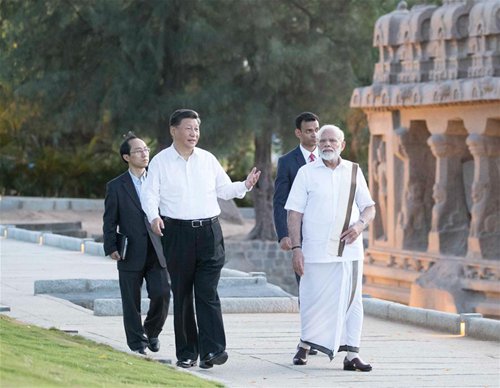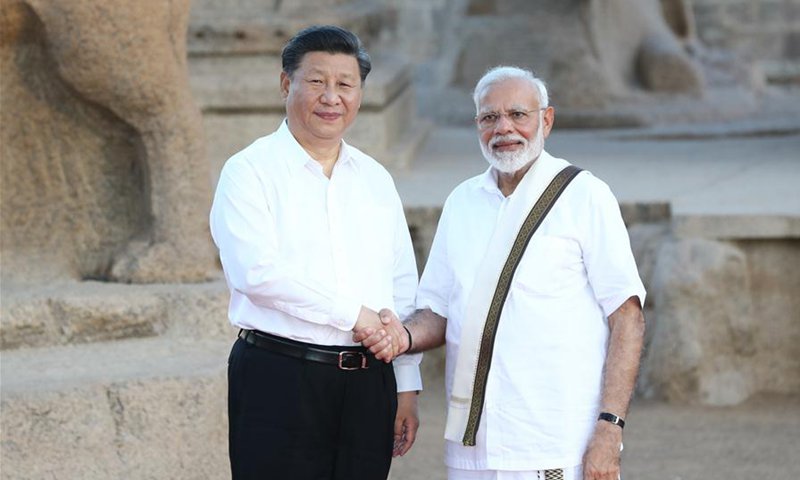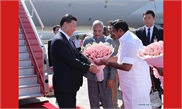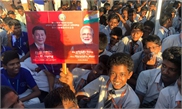
Indian Prime Minister Narendra Modi gives Chinese President Xi Jinping a guided tour of the Group of Monuments at Mahabalipuram, India, Oct. 11, 2019. Chinese President Xi Jinping met with Indian Prime Minister Narendra Modi in the southern Indian city of Chennai on Friday. (Xinhua/Wang Ye)

Indian Prime Minister Narendra Modi gives Chinese President Xi Jinping a guided tour of the Group of Monuments at Mahabalipuram, India, Oct. 11, 2019. Chinese President Xi Jinping met with Indian Prime Minister Narendra Modi in the southern Indian city of Chennai on Friday. (Xinhua/Wang Ye)
Chinese President Xi Jinping and Indian Prime Minister Narendra Modi agreed here Friday to promote exchanges and mutual learning among civilizations to achieve joint development and prosperity.
Xi and Modi held their second informal meeting in the southern Indian city of Chennai following their first in the central Chinese city of Wuhan in April last year.
During Xi's trip from hotel to Mahabalipuram in the state of Tamil Nadu, people from all walks of life, including young students, lined the streets waving Chinese and Indian national flags, with young men and women in Indian traditional costumes singing and dancing, to welcome the Chinese president for his visit.
Receiving Xi at the entrance, Modi also extended warm welcome to the Chinese president.
Xi recalled his successful meeting with Modi in Wuhan last year, which brought China-India relations into a new stage, and said that he is delighted to come to Tamil Nadu in southern India to further learn about the country.
Modi gave Xi a guided tour of the Group of Monuments at Mahabalipuram, which was built during 7th and 8th century and includes Arjuna's Penance, Panch Rathas, Shore Temple and other monuments. The two leaders held an extensive talk during the tour on dialogue and mutual learning among civilizations.
Tamil Nadu, a maritime transit hub for cargoes in the ancient Silk Road, has a long history of exchanges with China and close connections with China on maritime trade since ancient times, Xi said.
Both as ancient civilizations with several thousand years of history, China and India have carried on their exchanges and mutual learning till this day, he said.
The two countries' ancestors have overcome various obstacles to carry out extensive exchanges and promote the development of literature, art, philosophy and religion, which have greatly benefited both sides, Xi said.
Noting that China-India cultural and people-to-people exchanges bear great potential, the Chinese president urged both countries to take the 70th anniversary of China-India diplomatic relations next year as an opportunity to conduct broader and deeper cultural and people-to-people exchanges.
He also called on the two countries to jointly advocate and push forward dialogue and exchanges among different civilizations, so as to inject more lasting driving force into the development of bilateral ties and continue to produce new glory for Asian civilizations.
Modi told Xi that the Group of Monuments at Mahabalipuram is an outstanding example of India's cultural heritage and architecture, and witnessed India and China's civilization exchanges and historical connections for more than a dozen centuries.
After their development for several thousand years, India and China have both become important emerging economies, Modi said, stressing that enhancing exchanges and cooperation bears great significance to the two countries and will promote global progress and prosperity.
The wisdom from the two countries' ancient and profound civilizations can provide inspiration for solving various challenges facing the world today, said the Indian prime minister.
Accompanied by Modi, Xi watched Bharatanatyam and other Indian classical dances, which represent ancient Indian civilization.
In the Shore Temple on the coast of the Indian Ocean, Xi and Modi talked about the domestic development of China and India and exchanged experience in state governance.
The two leaders agreed that China and India should respect and learn from each other so as to jointly achieve common development and prosperity, as well as the great rejuvenation of the two civilizations.



